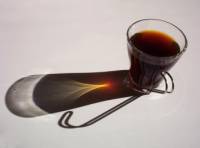What does the headache caffeine connection mean to you?
Most experts agree that there's a headache caffeine connection, but not all agree on what exactly that means to you. Let's cut through the opinions and find out exactly what you need to know about the headache caffeine issue...

Caffeine – what it does to you!
Since you're reading this you probably already know that caffeine is a stimulant found in drinks such as coffee, tea, colas and other soft drinks. Caffeine is put in certain drugs such as Cafergot, Fiorinol, Dristan and Excedrin.
Being a stimulant, caffeine works on the central nervous system and makes you more alert. But that's not all. It also acts as a vasoconstrictor (constricts your blood vessels), as a diuretic, and it may even increase blood pressure. It can cause other reactions in some people. Though usually not classified as an addictive drug, caffeine can be addictive in the sense that you can experience withdrawal symptoms if you stop taking it.
A headache caffeine connection – The Good News
Caffeine has long been used as a headache remedy. (Did you know that early on Coca-Cola was sold as a headache remedy?) But why does it help?
Migraine sufferers may be especially interested in the way caffeine constricts blood vessels. Blood vessels increasing in size is one of the common occurrences when you're having a migraine. Many migraine medications focus on getting the blood vessels back to their normal size before they wreak havoc on the nerves around them. Some migraine sufferers find that a coffee or coke early on in their headache will keep it at bay.
In medications, caffeine seems to increase the value of the painkillers also. This is why it's afton included various types of tylenol, for example.
As a stimulant, it may be that that little pick-me-up is all you need to keep a headache from hitting. This is compounded by the sugar added to coffee or found in colas.
A headache caffeine connection – The Bad News
Many of the things that can help can also hinder. As a stimulant, especially combined with sugar, caffeine can pick you up but may also drop you quickly. One of the worst things a migraine prone person can do it to take in large amounts of sugar and caffeine on an empty stomach, which can make you blood sugar levels do some pretty wild things, and may stimulate that caffeine headache. In other words, if you're stopping for tea, don't forget the crumpets!
As a diuretic, caffeine may also rob your body of some of the things it really needs. For example, research is showing that migraine sufferers may need to increase the amounts of magnesium in their bodies. But caffeine may be taking it out of your body when you're trying to put it in!
What caffeine does to your blood vessels may be good and bad too. Although it may help to constrict your blood vessels, the headache caffeine connection may be in the way it can backfire and also start expanding them!
The question of becoming used to caffeine, partly related to the way it acts on the blood vessels, may cause the worst problems. "Weekend headache" is often caused when someone drinks a couple cups of coffee every morning at work, and then sleeps in during the weekend. Since most of us don't drink coffee while we sleep, the withdrawal can trigger a migraine.
Medications add to the problem – combining aspirin with coffee, or drugs containing caffeine, can heighten the bad effects.
Caffeine may also cause unneeded anxiety, especially if taken in large quantities and without proper food and sleep. Stress can lower your "resistance" to migraine triggers, and compounded with the steady drip of the coffee pot your stress may be much worse!
A study was done with children and teenagers to check the link between drinking colas and headache, and to see if there is a headache caffeine link. Each participant was a heavy cola drinker, averaging about 1.5 litres a day. All had chronic headache, none had a history of migraine. All of them gradually stopped drinking cola over 1-2 weeks, and over 91% were headache free during the next 24 weeks! The others had occasional migraine instead of daily chronic headache.
Although for some this may seem like an extreme example, the truth is that many people are consuming very large amounts of caffeine each day. Read more about this study at the World Headache Alliance...
What to do about it...
Some experts believe that it's not so much the quantity of caffeine as it is the consistency, or how regularly you take it. For a migraineur, it's especially true that whatever changes you make in your diet, you should make gradually. Try to even out the amount of caffeine you take to the same amount every day, and better yet, try to make this amount 0!
Check the amounts of caffeine in your drugs, along with your foods. The average cup of (drip) coffee contains about 135mg, black tea 35mg, diet Coke 46mg. Tylenol #1 contains 15mg. Excedrin Migraine 65mg. Many experts suggest keeping your daily intake between 200mg and 600mg. Keeping your intake steady and low should help you avoid a headache caffeine connection.
For a generally positive view of caffeine, see the American National Headache Foundation's section on the headache caffeine connection.
For a more anti-caffeine view, take a look at the fascinating information at MyAddiction.com.
Let's summarize:
* Analyze how much caffeine you're taking in
* Try to make your daily amounts as consistent as possible
* Try to make your daily amounts as low as possible
* Avoid drinking caffeinated, sugary drinks without other food
* Keep a diary to see if there is a headache caffeine link
If you've found this information on the headache caffeine connection helpful, why not subscribe to our free e-zine,
HeadWay, for more current and practical headache-fighting tips?